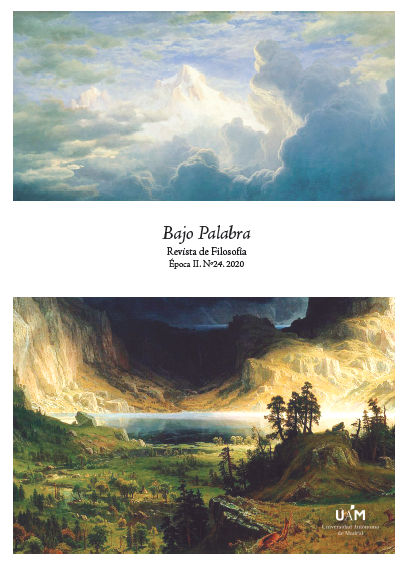Nietzsche and the aesthetic experience as "superabundance of communicative forces"
Keywords:
Seleccionado:Nietzsche, communication, aesthetics, art, communityCopyright (c) 2020 Maybeth Garcés Brito

This work is licensed under a Creative Commons Attribution 4.0 International License.
Abstract
The following article aims to explore the type of communicability that, from the Nietzschean perspective, takes place in the aesthetic experience. Outside the traditional framework of modern aesthetics based on the subject and on the premise that the transcendental principles guarantee intersubjectivity and, therefore, communication, Nietzsche thinks a kind of language that can establish links and articulate communities that contemplate reality’s spontaneous character and the differences from others without reducing them to the level of discourse, meanings or representations.
Downloads
References
Agamben, G., Medios sin fin, Valencia, Pre-Textos, 2001.
Clark, M., “On creating values”, Nietzsche-Studien, Vol. 44, No. 1, 2015, pp. 98-103. DOI: https://doi.org/10.1515/nietzstu-2015-0114
Cragnolini, M., Moradas Nietzscheanas: Del sí mismo, del otro y del "entre", 2ª edición, Buenos Aires, La Cebra.
Deleuze, G., Nietzsche y la filosofía, Barcelona, Anagrama, 1998.
Garcés, M., “Los valores estéticos como valores fisiológicos: Nietzsche y la fisiología del arte”, Mutatis Mutandis: Revista Internacional de Filosofía, USACH, No. 11, 2018, pp. 13-34.
Heidegger, M., Caminos de bosque, Madrid, Alianza, 2010.
Kant, I., Crítica de la facultad de juzgar, Caracas, Monte Ávila, 2006.
Lemm, V., “Verdad, incorporación y probidad (Redlichkeit)”, Estudios Nietzsche, No. 15, Madrid, Trotta, 2015, pp. 63-82. https://doi.org/10.24310/EstudiosNIETen.vi15.10787
Nietzsche, F., Fragmentos póstumos (1869-1874), Vol. I, 2ª edición, Madrid, Tecnos, 2010
— Fragmentos póstumos (1882-1885), Vol. III, Madrid, Tecnos, 2010.
— Fragmentos póstumos (1885-1889), Vol. IV, Madrid, Tecnos, 2008.
— Obras completas, Vol. I, Escritos de juventud, 2ª edición, Madrid, Tecnos, 2016.
— Obras completas, Vol. II, Escritos Filológicos, Madrid, Tecnos, 2013.
–– Obras completas, Vol. III, Obras de madurez I, Madrid, Tecnos, 2014.
–– Obras completas, Vol. IV, Escritos de madurez II y complementos a la edición, Madrid, Tecnos, 2016
Sánchez De León, J., “Hegel y el destino de la noción moderna de representación”, Endoxa, No. 27, Madrid, UNED, 2011, pp. 103-132. DOI: https://doi.org/10.5944/endoxa.27.2011.5271
